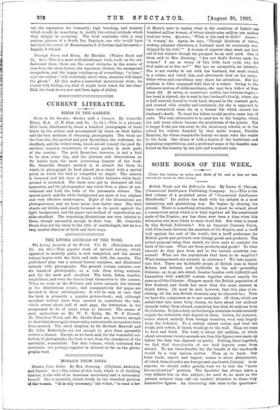MOSAICS FROM INDIA.
Mosaics from India. By Mrs. Denning. (Oliphant, Anderson, and Ferrier. 6s.)—The writer of this book, which is of thrilling interest, is the wife of an American missionary and a missionary herself. She is naturally struck chiefly by the wretched position c the women. " It is only necessary," she writes, " to read a few
of Manu's laws to realise what is the condition of India's one hundred million women, of whom ninety-nine million can neither read nor write. Question: 'What is the road to Hell ?' Answer ' A woman,' &c. Again, he says, 'Though destitute of virtue, seeking pleasure elsewhere, a husband must be constantly wor- shipped by his wife.' " A woman of superior class must not _look out of her window though the prospect be an arid yard. One of them said to Mrs. Denning: "Are not God's flowers made for women? I am so weary of this little back yard, why did God make us to live so ? " She has no occupation, no interests. She is not worthy to eat with her husband, but must crouch in a corner and watch him, and afterwards feed on his scraps. Other wives and concubines may share his attentions. But her position is bliss compared with that of a widow. Owing to the infamous system of child-marriages, she may be a widow at four years old. At seven, or sometimes earlier, her tortures begin,— her head is shaved, she is sent to her husband's family, where she is half starved, forced to work hard, dressed in the coarsest garb, and treated with cruelty and contumely, for she is supposed to have committed some sin in a former life which caused her husband's death. To treat her better would involve some loss of caste. The only alternative is to send her to the temples, where she and many others become the prostitutes of the priests. She is happy if she can run away to the missionary schools, or to the school for widows founded by that noble woman, Pundits Ramabai, for whose remarkable history we must refer the reader to the book. One closes it with a horror of the loathsome and degrading superstitions, and a profound sense of the benefits con- ferred on the country by our just and beneficent rule.






































 Previous page
Previous page